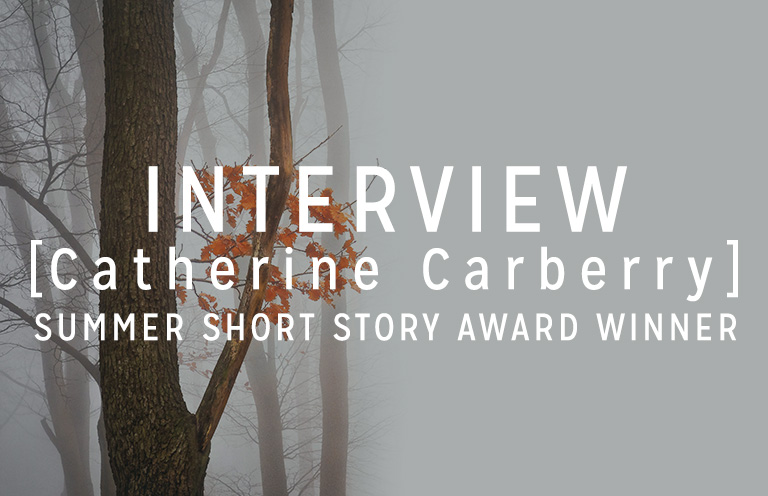Jai Chakrabarti selected “Dog Days” by Catherine Carberry as the 3rd place finalist in our 2023 Summer Short Story Award for New Writers. Be sure to check out the story if you haven’t, and then read our interview with the winner below!

As Jai Chakrabarti suggests in his introduction to “Dog Days,” this is very much a story that lives in the in-between spaces, in the juxtapositions, in what (or who) is not there. There are plenty of examples of this, but I’ll point to the paired absences of both B and Lori: Carla doesn’t interact with either in the present moment of the story (and in fact, we only ever hear about B; we don’t see him in any physical, real way throughout), but without either character in Carla’s life, we’d have a very different story – or no story at all. This sounds a bit like a chicken or the egg kind of question, but I’m curious about the decision to set the story here and now, after Lori’s murder, in this beach town away from the mountains where Carla lives. Were there versions of this story where B was in town? Were there versions of the story centered around Carla meeting Lori?
There would be good dramatic potential if the story had stayed in town in the aftermath of violence, but I knew from the beginning that I wanted Carla to be running from the crime. I wanted there to be a sense of drifting as she reckons with impermanence and entitlement: was Lori entitled to her friendship by virtue of proximity? Was Carla entitled to a house on stolen land? Was B entitled to his family’s wealth? And what do these characters do with what they have been given? At least B is generous with what he has; Carla is more guarded. Does that make her a bad person? No one wants to believe themselves morally rotten, of course, but I think she’s both highly attuned to morality and wrestling with her own blind spots. Without other characters to perceive or challenge her, she’s all alone with these questions. That’s the state I was interested in exploring.
Carla finds kinship with Lori over their abusive (ex-) partners, although she keeps this to herself. Peter and Carla’s ex-husband are unsettling and imposing figures on the periphery of this story, but again, it’s that balance of what’s present and what’s beyond that works so well here. The annotated letters are so sinister and cruel, but of course they’re balanced against Peter’s crime. Those letters are perhaps the perfect characterizing detail – I don’t need to see any more of him or Carla’s relationship with him to understand him, or understand how he impacts Carla’s life after their relationship ends. Is that how he first took shape for you, in these letters?
Yes. I did not want the ex-husband to be present on the page, but I wanted him to be haunting Carla through his letters. The ex-husband doesn’t pose a physical danger like Peter, but his weapon of choice is pathologizing Carla, telling her what kind of a person she is, imposing his subjective reality on her and calling it fact. Words have the power to define a narrative, but they can also be easily discarded—letters shoved into the bottom of the trash can. A professor friend taught me how letters historically were used to control women. A love letter could be used as blackmail to force a woman to marry, and to gain access to her wealth. So in a story that chronicles the aftermath of male violence, I wanted to look at the many forms that violence can take.
I’m asking process questions, so I might as well get this one out there too: What’s your writing process like? What routines or rituals do you have? Are you a plotter or do you write to discover?
Lately, my stories tend to begin with a version of the truth. The town I live in is not dissimilar from Carla’s town; there may or may not be a ghost plane here. But there always comes a part in the first draft where I feel the story splintering off from me, the character becoming someone else. I may begin with some broad goal—for this story, I wanted to see what would happen if I put a dead body on the first page—but otherwise I write to discover what is preoccupying me, what questions I have, and what experiences might complicate or illuminate those questions. It was only after I drafted that I realized I’d written a story about entitlement, class, belonging, and what it means to be “good.” I’ve also always wondered what it would be like to have a family legacy bound to one place, so I gave that to Carla.
Who are your influences? Who are those writers you’re always coming back to?
Renata Adler, first and foremost. There is this line in Speedboat: “I think when you are truly stuck, when you have stood still in the same spot for too long, you throw a grenade in exactly the spot you were standing in, and jump, and pray. It is the momentum of last resort.” I learned the hard way that this is not a great ethos to test out in your life, so now I apply it to my characters. I think you could say that this story begins with a character following the momentum of last resort. I also love Lucia Berlin, Karen Russell, and Rachel Kushner—each sentence of theirs is a masterclass, a whole world.
Interviewed by Cole Meyer
